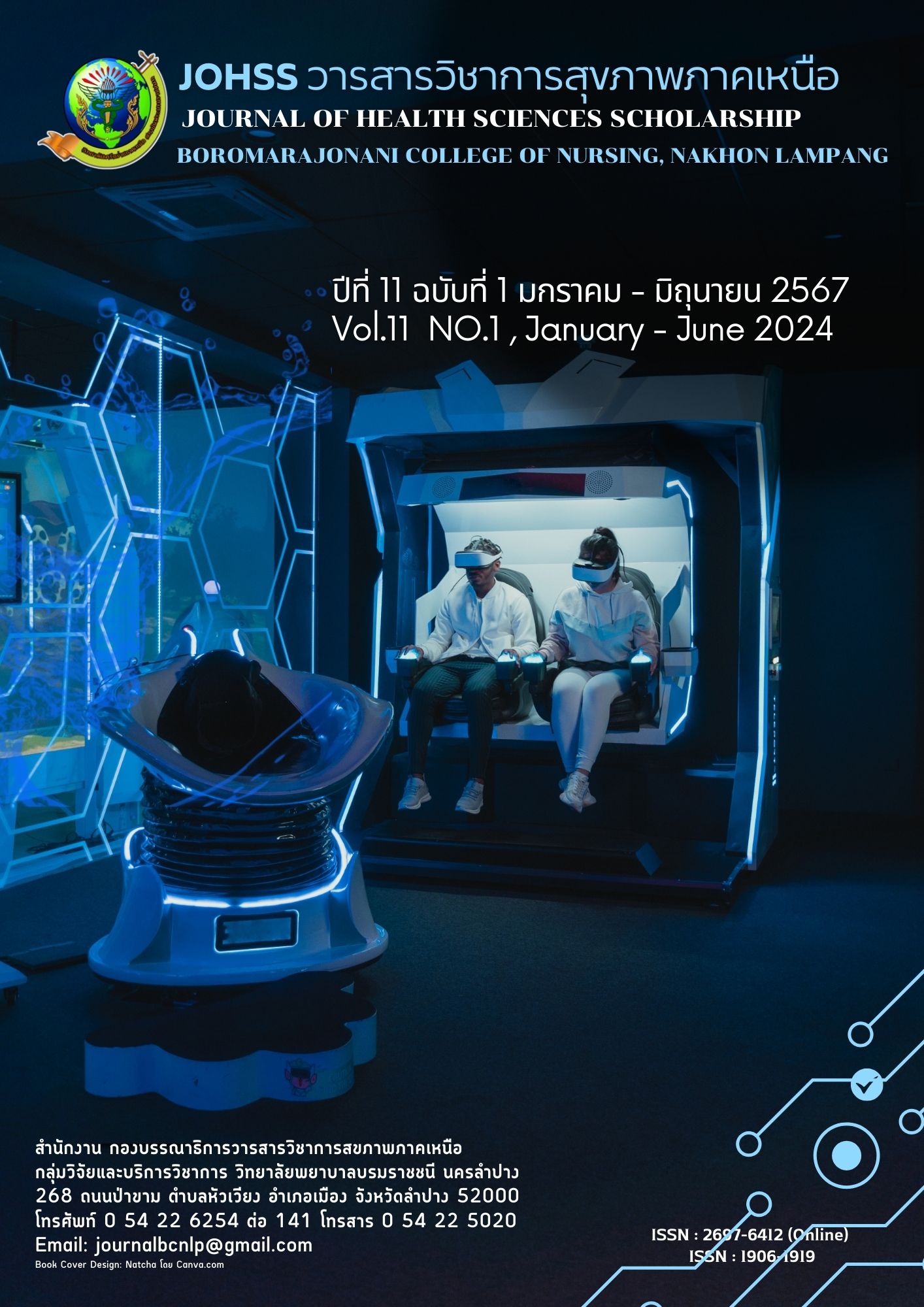ผลของโปรแกรมการพัฒนาคุณลักษณะพยาบาลด้านหัวใจความเป็นมนุษย์
คำสำคัญ:
หัวใจความเป็นมนุษย์, คุณลักษณะการพยาบาล, นักศึกษาพยาบาลบทคัดย่อ
การศึกษานี้เป็นการวิจัยกึ่งทดลองแบบกลุ่มเดียว เพื่อศึกษาผลของการพัฒนาคุณลักษณะการพยาบาลด้วยหัวใจความเป็นมนุษย์ของนักศึกษาพยาบาล และเพื่อเปรียบเทียบค่าเฉลี่ยของเจตคติ และความตระหนักในคุณลักษณะการพยาบาลด้วยหัวใจความเป็นมนุษย์ของนักศึกษาพยาบาล ระหว่างก่อน หลัง และระยะติดตามการเข้าร่วมอบรม กลุ่มตัวอย่าง คือ นักศึกษาชั้นปีที่ 3 คณะพยาบาลศาสตร์ มหาวิทยาลัยเอกชนแห่งหนึ่ง ใช้การสุ่มกลุ่มตัวอย่างแบบไม่อาศัยความน่าจะเป็น คัดเลือกแบบเจาะจง จำนวน 49 คน ใช้เวลาเก็บรวบรวมข้อมูล 5 เดือน เครื่องมือในการวิจัย คือ การพัฒนาคุณลักษณะการพยาบาลด้วยหัวใจความเป็นมนุษย์ ในรูปแบบการอบรมจำนวน 3 วัน ส่วนเครื่องมือในการเก็บรวบรวมข้อมูล ประกอบด้วย 3 ส่วน คือ ข้อมูลส่วนบุคคล แบบสอบถามเจตคติทางการพยาบาล และแบบสอบถามความตระหนักในคุณลักษณะการพยาบาลด้วยหัวใจความเป็นมนุษย์ของนักศึกษาพยาบาล วิเคราะห์ข้อมูลโดยใช้การแจกแจงความถี่ ร้อยละ ค่าเฉลี่ย ส่วนเบี่ยงเบนมาตรฐาน และสถิติอ้างอิงวิเคราะห์ความแปรปรวนทางเดียวแบบวัดซ้ำ
ผลการวิจัยพบว่า เจตคติทางการพยาบาลของนักศึกษาพยาบาล มีค่าเฉลี่ยเพิ่มขึ้นกว่าก่อนการอบรมทั้งในระยะหลังการอบรม และระยะติดตามผล ส่วนความตระหนักในคุณลักษณะการพยาบาลด้วยหัวใจความเป็นมนุษย์ของนักศึกษาพยาบาลหลังการอบรม มีค่าเฉลี่ยเพิ่มขึ้นกว่าก่อนการอบรม และระยะติดตามผล สำหรับความตระหนักในคุณลักษณะการพยาบาลด้วยหัวใจความเป็นมนุษย์ของนักศึกษาพยาบาลด้านความสามารถ ความเชื่อมั่น และการมีสติรู้ชอบ ทั้ง 3 ระยะ ไม่แตกต่างกันกันอย่างมีนัยสำคัญทางสถิติที่ระดับมากกว่า .05 แต่มีความเห็นอกเห็นใจ และความมุ่งมั่น มีความแตกต่างกันอย่างมีนัยสำคัญทางสถิติที่ระดับน้อยกว่า .05 การศึกษาครั้งนี้สามารถนำไปใช้เป็นแนวทางในการจัดการเรียนการสอนเพื่อพัฒนาคุณลักษณะการพยาบาลด้วยหัวใจความเป็นมนุษย์ของนักศึกษาพยาบาลได้อย่างมีประสิทธิภาพ
เอกสารอ้างอิง
Amornrojanavaravutti, W., Somtus, N., & Tippayaphalapholgul, B. (2020). Integrated learning management for Nursing student development in humanized health care, Praboromrachanok Institute. Journal of Research and Curriculum Development, 10(1), 125-151. (in Thai)
Bloom, B.S. (Ed.). Engelhart, M. D., Furst, E. J., Hill, W. H., Krathwohl, D. R. (1956). Taxonomy Of Educational Objectives, Handbook I: The Cognitive Domain. David McKay Co Inc.
Busch, I. M., Moretti, F., Travaini, G., Wu, A. W., & Rimondini, M. (2019). Humanization of care: Key elements identified by patients, caregivers, and healthcare providers. A systematic review. The Patient-Patient-Centered Outcomes Research, 12, 461-474.
Choi, S. Y., & Peng, Y. (2015). Humanized management? Capital and migrant labour in a time of labour shortage in South China. Human Relations, 68(2), 287-304.
Choojai, R. (2015). Graduate users' satisfaction with the quality of nursing graduates Boromarajonani College of Nursing, Ratchaburi, academic year 2012. Report of the 6th National and International Academic Conference and Presentation of Research Results in the Humanities and Social Sciences, 6(2), 418- 425. (in Thai)
Ekwarangkun, S. (2019). Psychiatric and mental health nursing and art into practice 1. Time Printing.
Granovetter, M. (2018). The impact of social structure on economic outcomes. In The sociology of economic life. Routledge.
Huitt, W. (2011). Bloom et al.'s taxonomy of the cognitive domain. Educational psychology interactive, 22, 1-4.
Intana, J., Srimahunt, K., & Meebunmak, Y. (2021). Perception Humanized-Cared Behaviors of Nursing Students in academic year 2019of Boromarajonani College of Nursing, Ratchaburi. Journal of research for Health Improvement and Quality of Life, 1(2), 43-54.
Kittiraktrakul, S. (2011). Development of a psychiatric network model with the human heart of College under the Praboromarajchanok Institute. Journal of Nursing Division, 38(1),16-30. (in Thai)
Leininger, M. M., McFarland, M. R., & McFarlane, M. (1987). Transcultural nursing. Cambridge. USA: Lincoln Institute of Health Sciences.
Magalhães Carvalho, N., Sampaio Nery, I., Campelo, V., & Alcântara Barbosa, V. R. (2016). The teaching humanization in the nursing bachelor course in a public university. Journal of Nursing UFPE/Revista de Enfermagem UFPE, 10(12), 4554 - 4562.
Meneses-La-Riva, M. E., Suyo-Vega, J. A., & Fernandez-Bedoya, V. H. (2021). Humanized care from the nurse–patient perspective in a hospital setting: a systematic review of experiences disclosed in spanish and portuguese scientific articles. Frontiers in Public Health, 9, 737506.
Naphet, O., Palabut, K., Laothong, K., Hemon, K., Mirattanaphrai, K., Nipakun, K., Sihawong, K., Homchaen, G., & Chaiwannawat, T. (2018). Self-awareness and Recognition benefits of Self-awareness of nursing student in a private university in Ubon Ratchathani Province. Journal of Ratchathani Innovative Health Sciences, 2(2), 60-73. (in Thai)
Patipattarakul, P., Dumrongkittikul, B., & Boonprathum, K. (2565). Effects ofUsing Reflective Thinking Skills on Nursing Behavior for HumanizedCare among Nursing Students. Journal of Health Research and Innovation, 5(2), 115-123. (in Thai)
Phetpradap, P. (2015). Factors affecting behavior in managing nursing shortages. In. The 4th STOU Graduate Research Conference, 26-27 November 2015.
Phumivadhana, S. (2020). Humanized nursing care for patients receiving invasive mechanical ventilator: From concept to practice. Vajira Nursing Journal, 22(1), 70-91. (in Thai)
Poorananon, P., & Panidchakul, K. (2018). Self-development for evidenced-based human caring in nursing students. Journal of Boromarajonani College of Nursing, Bangkok, 34(2), 125-137. (in Thai)
Prasrertsong, C., Benjamin, A., & Wanfun, P. (2016). The Study to Confirm and Develop the Measure of Nursing Practice by Heart for Nursing Students. Journal of The Royal Thai Army Nurses, 17(3), 132 -140. (in Thai)
Roach, M. S. (1992). The human act of caring: A blueprint for health professions. Canadian Hospital Association Press.
Sangchang, C. (2009). Let's return the heart to the health system. Health doctor, 19(1), 21-39. (in Thai)
Santos, B. M. D., Silva, R. M. C. R. A., Pereira, E. R., Joaquim, F. L., & Goés, T. R. P. (2018). Nursing students' perception about humanized care: an integrative review. Revista Brasileira de Enfermagem, 71, 2800-2807.
Sosome, B., Wiwekwan, Y., & Suwannaka, Y. (2017). The Humanized Health Care Model for Nursing Care Pregnancy Women: Knowledge from Nursing Student Experiences. Journal of MCU Peace Studies, 5(2), 245-258. (in Thai)
Srisatitnarakul, B. (2010). Nursing Research Methodology (5th ed.). You and I Intermedia, Ltd. (in Thai)
Taylor, L. D. (2014). The affective domain in nursing education: Educators' perspectives [Doctoral dissertation]. The University of Wisconsin-Milwaukee.
Udomluck, S., Vongchaiya, P., Tachawisad, S, & utjasakulrat, S. (2016). Humanized Health Care Identity among Graduates of Boromarajonani College of Nursing, Phayao. Nursing Journal of The Ministry of Public Health, 25(3), 14-26. (in Thai)
Wangthong, A., Wangthong, A., Watsen, T., & Suttarangsri, W. (2014). Clients’ Perspectives on Humanized Nursing Care within a Multicultural Context: A Case Study of Nongjik District, Pattani Province. Nursing Journal of the Ministry of Public Health, 23(3), 35-44. (in Thai)
Watson, J. (1999). Nursing: Human science and human care: A theory of nursing. Jones & Bartlett Learning.
Wolf, E. R. (2013). Kinship, friendship, and patron-client relations in complex societies. In Social anthropology of complex societies. Routledge.
ดาวน์โหลด
เผยแพร่แล้ว
ฉบับ
ประเภทบทความ
สัญญาอนุญาต
ลิขสิทธิ์ (c) 2024 วิทยาลัยพยาบาลบรมราชชนนี นครลำปาง

อนุญาตภายใต้เงื่อนไข Creative Commons Attribution-NonCommercial-NoDerivatives 4.0 International License.
บทความ ข้อมูล เนื้อหา รูปภาพ ฯลฯ ที่ได้รับการตีพิมพ์ในวารสารวารสารวิชาการสุขภาพภาคเหนือ ถือเป็นลิขสิทธิ์ของวารสารวารสารวิชาการสุขภาพภาคเหนือ หากบุคคลหรือหน่วยงานใดต้องการนำทั้งหมดหรือส่วนหนึ่งส่วนใดไปเผยแพร่ต่อหรือเพื่อกระทำการใดๆ จะต้องได้รับอนุญาตเป็นลายลักอักษรจากวารสารวารสารวิชาการสุขภาพภาคเหนือก่อนเท่านั้น
เนื้อหาและข้อมูลในบทความที่ลงตีพิมพ์ในวารสารวิชาการสุขภาพภาคเหนือถือเป็นข้อคิดเห็นและความรับผิดชอบของผู้เขียนบทความโดยตรงซึ่งกองบรรณาธิการวารสาร ไม่จำเป็นต้องเห็นด้วย หรือร่วมรับผิดชอบใดๆ
อนึ่ง ข้อความและข้อคิดเห็นต่างๆ เป็นของผู้เขียนบทความนั้นๆ ไม่ถือเป็นความเห็นของวารสารฯ และวารสารฯ ไม่จำเป็นต้องเห็นด้วยกับข้อความและข้อคิดเห็นใดๆ ของผู้เขียน วารสารฯ ขอสงวนสิทธิ์ในการพิจารณาตีพิมพ์ตามความเหมาะสม รวมทั้งการตรวจทานแก้ไขหรือขัดเกลาภาษาให้ถูกต้องตามเกณฑ์ที่กำหนด



